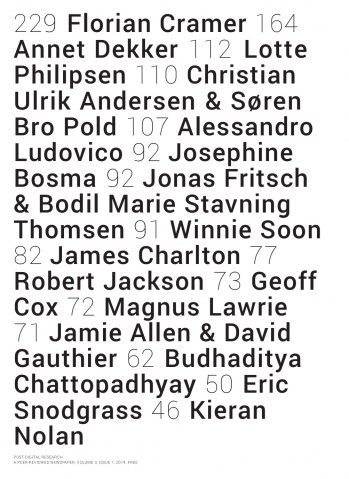A Peer-Reviewed Journal About, 3(1): Post-Digital Research (2014)
Filed under journal | Tags: · aesthetics, media, media theory, postdigital, publishing, research

“This issue of the journal addresses the messy and paradoxical condition of art and media after digital technology revolutions and critically reflects on the term “post-digital”. The issue is the outcome of a process where a number of researchers, artist-researchers and Ph.D.’s have collaborated in presenting and exchanging ideas around the subject. This follows an earlier call from transmediale festival, Berlin, and a research event at Kunsthal Aarhus. The issue does not present a uniform interpretation of the notion, but includes a variety of positions related to the use of the term, its application within various fields, and how it is reflected in artistic research.”
With contributions by Jamie Allen, Christian Ulrik Andersen, Josephine Bosma, James Charlton, Budhaditya Chattopadhyay, Geoff Cox, Florian Cramer, Annet Dekker, Jonas Fritsch, David Gauthier, Robert Jackson, Magnus Lawrie, Alessandro Ludovico, Kieran Nolan, Lotte Philipsen, Søren Pold, Eric Snodgrass, Bodil Marie Stavning Thomsen and Winnie Soon.
Edited by Christian Ulrik Andersen, Geoff Cox and Georgios Papadopoulos
Publisher Digital Aesthetics Research Center, Aarhus University, Aarhus, in collaboration with reSource transmedial culture Berlin/transmediale, Berlin, Jun 2014
Creative Commons Attribution-NonCommercial-ShareAlike license
ISSN 2245-7755
HTML (updated on 2021-5-4)
PDFs (updated on 2021-5-4)
PDF (44 MB)
Roswitha Mueller: Bertolt Brecht and the Theory of Media (1989)
Filed under book | Tags: · aesthetics, cinema, film, film theory, media, media theory, opera, politics, radio, theatre

Bertolt Brecht spent a career puncturing artistic illusion while casting a spell as an innovator that has continued since his death in 1956. Best known to theater goers for “The Threepenny Opera,” “Mother Courage and her Children,” “The Caucasian Chalk Circle” and other production, the great playwright was, in fact, a man of all media. He was interested in radio and the cinema as soon as they appeared in Europe and brought to them, as well as to the stage, a dramatic theory so radical and influential that it has come to be known by the adjective “Brechtian.”
Publisher University of Nebraska Press, Lincoln & London, 1989
Modern German Culture and Literature series
ISBN 0803231326, 9780803231320
149 pages
Reviews: Katie Trumpener, Susan Bennett (Theatre Research International).
PDF (no OCR)
Comment (0)Alexander R. Galloway: The Interface Effect (2012)
Filed under book | Tags: · aesthetics, computing, ideology, interface, media, media theory, mediation, ontology, philosophy, politics, software

“Interfaces are back, or perhaps they never left. The familiar Socratic conceit from the Phaedrus, of communication as the process of writing directly on the soul of the other, has returned to center stage in today’s discussions of culture and media. Indeed Western thought has long construed media as a grand choice between two kinds of interfaces. Following the optimistic path, media seamlessly interface self and other in a transparent and immediate connection. But, following the pessimistic path, media are the obstacles to direct communion, disintegrating self and other into misunderstanding and contradiction. In other words, media interfaces are either clear or complicated, either beautiful or deceptive, either already known or endlessly interpretable.
Recognizing the limits of either path, Galloway charts an alternative course by considering the interface as an autonomous zone of aesthetic activity, guided by its own logic and its own ends: the interface effect. Rather than praising user-friendly interfaces that work well, or castigating those that work poorly, this book considers the unworkable nature of all interfaces, from windows and doors to screens and keyboards. Considered allegorically, such thresholds do not so much tell the story of their own operations but beckon outward into the realm of social and political life, and in so doing ask a question to which the political interpretation of interfaces is the only coherent answer.
Grounded in philosophy and cultural theory and driven by close readings of video games, software, television, painting, and other images, Galloway seeks to explain the logic of digital culture through an analysis of its most emblematic and ubiquitous manifestation – the interface.”
Publisher Polity, 2012
ISBN 0745662528, 9780745662527
170 pages
Review: McKenzie Wark (Public Seminar, 2015).
PDF (updated on 2021-12-16)
Comments (3)
